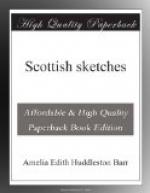The dominie had felt certain that Colin would answer his letter in person, but after a long silence he received it back again. Colin had left Rome, and left no trace behind him. The laird knew that Tallisker had written, and he too had been hoping and expecting. But he received the news of his son’s disappearance without remark. Life for some time was a dreary weight to him, he scarce felt as if he could lift it again. Hope after hope had failed him. He had longed so to be a rich man, had God in his anger granted him his wish? And was no other thing to prosper with him? All the same he clung to his gold with a deeper affection. When all other vices are old avarice is still young. As ambition and other motives died out, avarice usurped their places, and Tallisker saw with a feeling half angry, and half pitiful, the laird’s life dwindling down to this most contemptible of all aims. He kept his duty as proprietor constantly before the laird, but he no longer seemed to care that people should say, “Crawford’s men have the best laborers’ cottages in Scotland.”
“I hae made up my mind, Tallisker,” said fretfully, “the warld thinks more o’ the who mak money than o’ those who gie it awa.” Certainly this change was not a sudden one; for two years after Helen’s death it was coming slowly forward, yet there were often times when Tallisker hoped that it was but a temptation, and would be finally conquered. Men do not lose the noble savor of humanity in a moment. Even on the downward road good angels wait anxiously, and whisper in every better moment to the lapsing soul, “Return!”
But there was a seed of bitterness in Crawford’s heart, that was poisoning the man’s spiritual life—a little bit of paper, yet it lay like a great stone over his noblest feelings, and sealed them up as in a sepulchre. Oh, if some angel would come and roll it away! He had never told the dominie of Helen’s bequest. He did not dare to destroy the slip of paper, but he hid it in the most secret drawer of his secretary. He told himself that it was only a dying sentiment in Helen to wish it, and that it would be a foolish superstition in him to regard it. Perhaps in those last moments she had not understood what she was asking.
For a little while he found relief in this suggestion; then he remembered that the request must have been dictated before the fever had conquered her strength or judgment. The words were clearly written in Helen’s neat, precise manner; there was not a hesitating line in the whole. She had evidently written it with care and consideration. No one could tell how that slip of paper haunted him. Even in the darkness of its secret hiding-place his spiritual eyes saw it clearly day and night.
To give to the poor all he had intended to give to Helen! He could not! He could not! He could not do it! Helen could not have known what she was asking. He had meant, in one way or another, to give her, as the founder of the new line of Crawfords, at least one hundred thousand pounds. Was it reasonable to scatter hither and yon such a large sum, earned, as he told himself pitifully, “by his ain wisdom and enterprise!”




